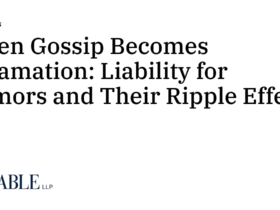In a published opinion, the Fourth Circuit recently affirmed a district court’s ruling that CBS News did not defame a pharmacist in its reporting on the opioid crisis, agreeing that the statements at issue were substantially true. See Ballengee v. CBS Broadcasting, Inc., No. 18-2018 (4th Cir. Aug. 3, 2020).
The ruling protects CBS’s award-winning investigative reporting on the opioid crisis. It also demonstrates the enduring need for defamation law’s “substantial truth doctrine,” which excuses minor factual inaccuracies as long as the substance, gist, or sting of the statement remains true. See Masson v. New Yorker Magazine, 501 U.S. 496, 517 (1991).
The case arose from two 2016 CBS Evening News reports on the opioid crisis in West Virginia that referenced plaintiff Randy Ballengee and his pharmacy. Back in 2007, Ballengee opened Tug Valley Pharmacy within two blocks of two pain management clinics. In its first few years, the pharmacy filled a large number of opioid prescriptions from the two clinics, which were later deemed “pill mills” by the state and forced to shut down.
Although Ballengee was never prosecuted for his acts, former customers filed lawsuits against him beginning in 2010 for negligently or recklessly filling prescriptions for opioids that contributed to their addiction. These suits are still pending today. In 2012, the state of West Virginia also sued several pharmaceutical distributors for their roles in the opioid epidemic in a lawsuit that described Tug Valley Pharmacy as a “pill mill pharmacy” that had filled “voluminous illegal prescriptions.” CBS reported on these lawsuits in its 2016 broadcast.
Following CBS’s report, a pharmaceutical distributor terminated its supply agreement with Tug Valley Pharmacy. Ballengee claims that he was unable to find another distributor to sell him controlled substances and ultimately sold his pharmacy in 2016.
In 2017, Ballengee sued CBS and three of its journalists for defamation, false light invasion of privacy, tortious interference, and intentional infliction of emotional distress, demanding $15 million in compensatory and punitive damages. After extensive discovery, the district court granted summary judgment for CBS on all claims, on the principal ground that the report was substantially true.
On appeal, Ballengee challenged the district court’s ruling only as to two allegedly defamatory statements—that the pharmacy “was filling more than 150 pain prescriptions a day from one clinic alone” and that Ballengee “admitt[ed] to filling 150 pain pill prescriptions daily for one clinic alone.” Ballengee, No. 18-2018 at *10-11.
The Fourth Circuit held that both statements were substantially true. As for the second statement, although Ballengee “did not literally state” in prior lawsuits “that he was filling 150 pain prescriptions daily for one clinic alone,” he testified that he filled “maybe 150 to 200” prescriptions per day for one clinic, and that that “most of” those patients “got some pain medication.” Id. at *11. Because this testimony would have produced a similar effect on the viewer as the broadcast statement (the gist of which was that Ballengee had admitted to filling a high volume of pain prescriptions daily, even from just one clinic), the court held that it was substantially true. Id.
As for the first statement, the Fourth Circuit held that it was supported by Ballengee’s prior testimony and by West Virginia Board of Pharmacy records (undisputed by Ballengee) showing that on at least seven occasions from 2008 to 2009, Tug Valley Pharmacy did in fact fill more than 150 prescriptions for pain medication from one clinic on a single day. Id. The sting of the broadcast statement—that Tug Valley Pharmacy was filling a suspiciously high number of pain prescriptions, including prescriptions from a single clinic—was justified by the facts. Id. at *12.
At bottom, the substantial truth doctrine remains intact, and litigants can now cite to Ballengee.















